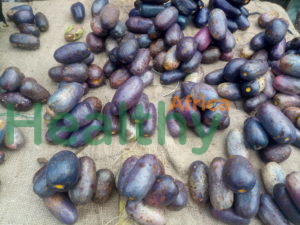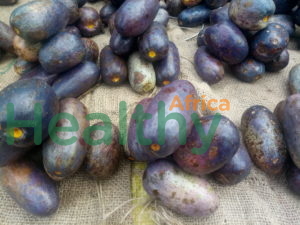
The Bush pear or African pear (Dacryodes edulis) goes by the local name ‘Ube’ in Nigeria. The purple-coloured fruit, however, has many other names such as the bush butter tree, Atanga (Gabon) and Butter fruit.
Unlike other kinds of pear such as Avocado pear, the taste of the bush pear is quite unique and it is not valued by everyone. Though it may not be widely eaten in Nigeria, it is mostly cherished by the people from the South-east. (it is sometimes called Ibo pear locally).
If you have not eaten it before, would you consider adding it to your diet? There are many benefits that you can get from this fruit. Let me share with you the nutrients that you can get from it.
Nutrition
Ube, the Bush pear, has about 18g of fat, 7.4g of protein, 15.5g of carbohydrate and 1.2g of fibre. That is, when you consume up to a 100g weight of it. Bush pear also has about 6mg of iron, 279.5mg of potassium, 14.6mg of sodium. It has an appreciable about of Vitamin C(13.4mg) and Beta carotene (Vitamin A).

There are other vitamins and minerals contained in Ube in very small quantities such as zinc, manganese but I highlighted the ones that appear to stand out. All these minerals and vitamins go a long way in maintain your body, preventing damage from oxidative stress as well as diseases.
The oil content of the Ube is quite high so much that it can be used as regular cooking oil. The oil of African pear oil is made up of about 47% of Oleic acid, which is a monounsaturated fatty acid (olive oil has about 70%; palm oil has 36%). It also contains about 44% of plamitic acid which is saturated fatty acid (palm oil has about 43%).
The fruit is usually eaten raw, cooked or roasted. Some traditions involve softening the Ube with hot ashes but it can also be softened with hot water or a hot plate. It can be eaten with boiled or roasted corn.
The tree as a whole is regarded as a medicinal one and the leaves, stem, bark and other parts of the tree have been used traditionally in the treatment of so many ailments. Some of them include Malaria, beriberi, ulcer, ear troubles, stomach disorders, digestive discomfort, insomnia, cough and many others.
In a Nutshell
Ube can provide you with lots of good nutrients like fibre, fat, potassium, vitamin C, Vitamin A to mention a few. This will, therefore, be a great addition to your diet if you already to not enjoy the fruit. Take this seasonal opportunity to try it if you have not ever tried it or indulge in it if you are a lover of Ube.
The goal remains to inspire you to eat better and live better.


